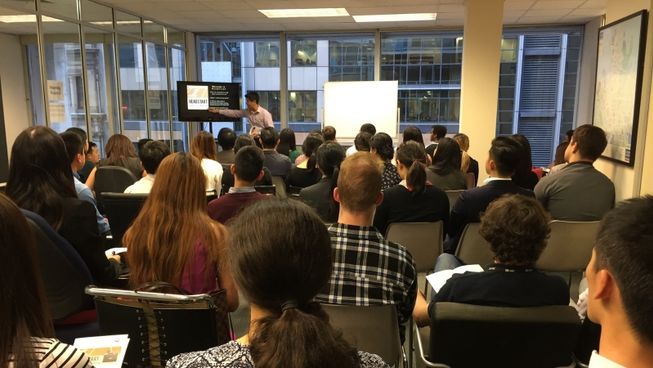Headstart - UNFILTERED #1: I've got more work (tbh I'm really not coping)

Carson is a young worker and a regular at Headstart whose recent brush with stress had him flying a connecting flight which was so delayed that he got a personal escort through the airport to make his next flight with just 10 minutes to take off! Back on home ground (and back to work), Carson shares his reflections and what he learnt after attending UNFILTERED #1: I've got more work (tbh i'm really not coping).
Night in a Tweet:
/stress/: the temporary strain that naturally happens when circumstances change.
Our theme for this term is UNFILTERED, where we are exploring topics which we hesitate to discuss openly about. It’s not as if these topics aren’t discussed, but when they are talked about, we sometimes self-censor for fear of (fill in your own blank).
The first of the UNFILTERED series, our topic is STRESS at work. “I’ve got more work, and to be honest, I am really not coping.''
Stress is great! We love stress. We crave it. Just look at what we do. We enrol in difficult post-graduate studies alongside full-time work. We apply for new roles with more responsibility. We like the excitement of tackling a new project with lots of new things to learn. We care for the well-being of our team and want them to flourish. We are driven to make impactful contributions to the company and community. We pray that we can be the salt and light in our workplaces, and to make Christ known.
Yet, of course, we also hate stress. Stress is pain, struggle and frustration. Can I really meet the deadline? Why do so many problems come up? If I don’t say yes to this new challenging project, am I giving up an opportunity to step up? If only my colleagues weren’t so difficult to work with. Will I be able to earn more money if I work harder? Can I keep up with my team with all that is going on outside of work? Can I really tell my colleagues and boss that I am not coping? Am I wasting away my talents? I really want to prove to myself and my boss that I can do this.
See what I mean? Stressful.
Even our culture values and pressures the state of being under stress. Nick Kyrgios, a tennis player with world-class talent, but with no care nor discipline to mentally focus and consistently train, gets roasted in the media for wasting his talent (amongst other things). A person who does not put themselves under stress in order to make use of their talent and opportunities is jarring in our society.
Living with Stress
We have a complicated relationship with stress. There are both positive and negative motivations for introducing stress into our lives as well as uncontrollable external circumstances. Understanding this, how should we live with stress?
As a model for life, we should always be looking towards Jesus. Did he have any stress in his life? Surprisingly, yes. When Lazarus died, how did Jesus respond? John 11:32-34:
32 Now when Mary came to where Jesus was and saw him, she fell at his feet, saying to him, “Lord, if you had been here, my brother would not have died.” 33 When Jesus saw her weeping, and the Jews who had come with her also weeping, he was deeply moved in his spirit and greatly troubled. 34 And he said, “Where have you laid him?” They said to him, “Lord, come and see.”
Jesus was troubled. Jesus was not immune. Stress is part of being human.
Kelly Mcgonigal cites an interesting study in a TED talk which points out 2 factors of how we might understand stress:
- Amount of stress
- Perceived negative impact of stress
Stress has a negative impact on health. This is something we’ve all at least heard of or experienced personally. However, Mcgonigal shares some surprising insight on the impact of stress: how we view the impact of stress in our lives can determine whether it has negative health impacts. This means that when stress is believed to be a good thing, it turns out that there are less negative health consequences than if we believe the opposite of the same stressful event. What we believe about stress matters.
The Christian world view is transformative in how we view stress. The sovereignty of God means that we can stress with security. When we hit stressful situations, when we don’t know what to do when we venture out into uncharted waters of our life, we know God has His plans for us (see Romans 11:33-36). Verse 35 goes further:
“Who has ever given to God, that God should repay them?”
The world values our productivity, the heights of our achievements, and the positive impact we have on our communities. However, God is different. He values us because we are His children. So, we do not need to prove ourselves to God by taking up every possible opportunity, maximising our time and talents.
Stress is present in the Bible but here it is confirmed as a good thing - as something that can refine us and build endurance, character and hope (1 Thessalonians 5:23-24; Romans 5:3-5).
We are known and loved by God who is in control, and in Jesus we can be in relationship with him and are, day by day, being shaped by Him.
Top Tips for Stress at Work
- Understanding the Spectrum of Stress - On this spectrum we see situations, seasons and states of stress. What you want to avoid is being in a state of stress - where it is no longer temporary. This will only lead to burn out. Temporary situations and seasons of stress (think EOFY or the first few months of being a new parent), with reflection, these situations and seasons can push us to grow. But being in a permanent state of stress only wears us down. The greatest advancements in the field of sport performance in recent years has been the focus and understanding of rest and recovery. Training introduces stress, and recovering well builds us up. The latest thinking in the workplace and leadership also correlate with these principles.
- Managing Up - If we are stuck in a permanent state of stress, then one advice would be to manage up - being able to start the conversation with your manager about how you are (not) coping and how to move forward. For many of us, our managers want us to thrive at work. Know that they also aren’t interested in putting you into a state of stress, and be brave to communicate your stresses with them.





